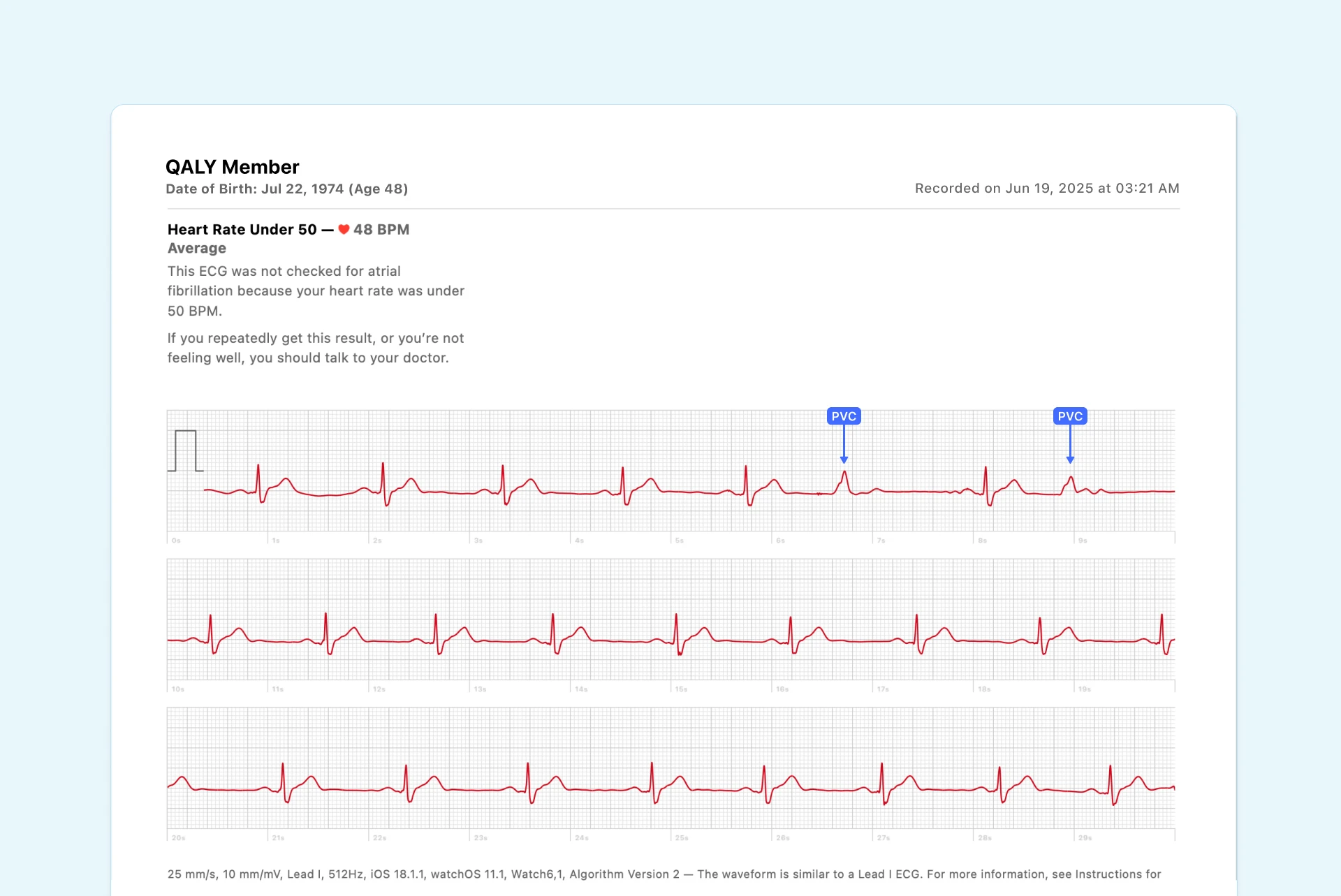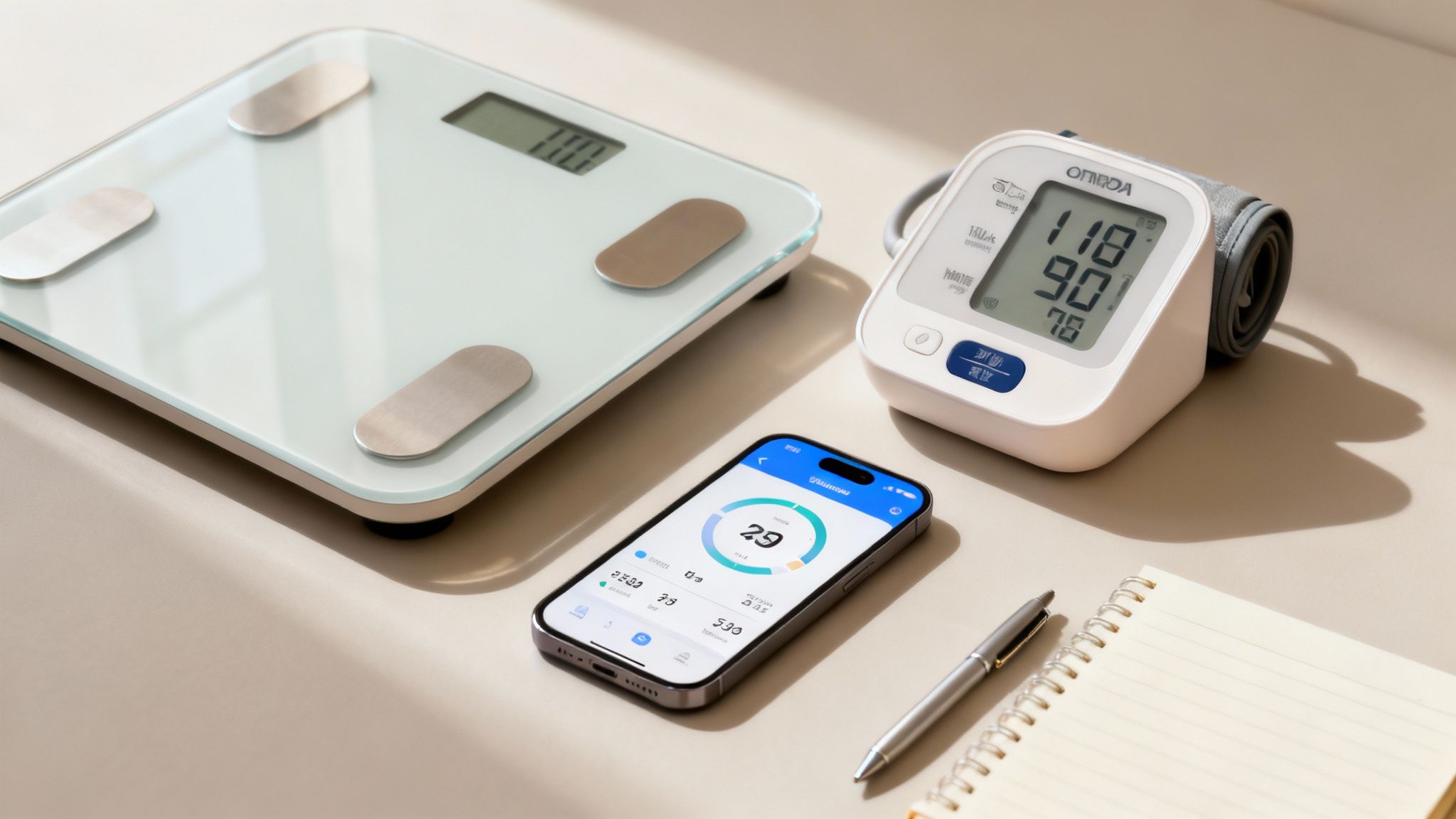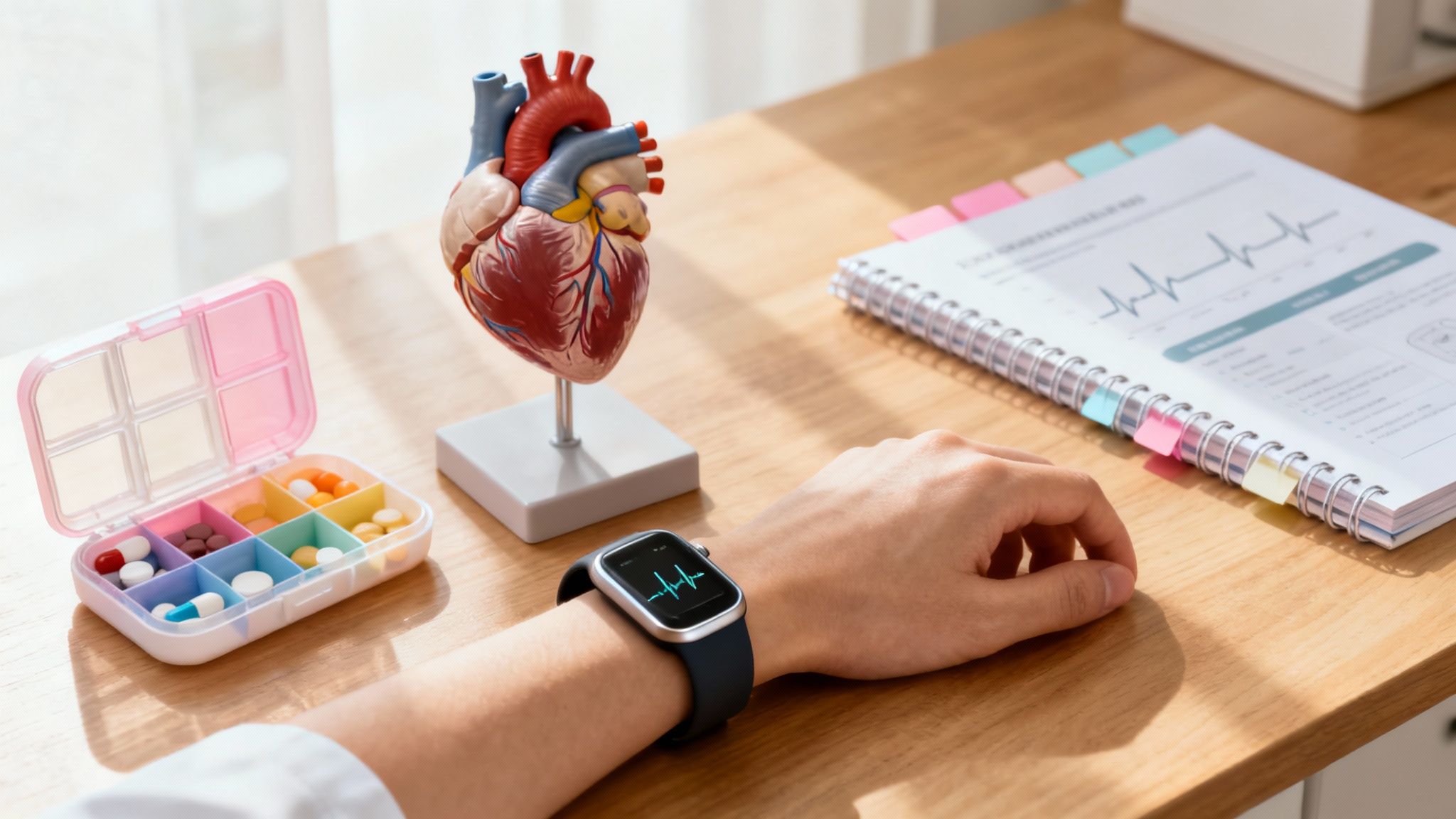Key Takeaways
Hello, heart hero. Getting a heart failure diagnosis can be scary, and the long list of new medications that often comes with it can feel completely overwhelming. We wrote this guide to be a clear, reassuring friend, breaking down everything you need to know about your prescribed drug for heart failure in simple terms.
Your Journey Starts Here
It's completely normal to feel a bit uncertain or even skeptical when you're navigating your health, especially when starting a new treatment plan. You've probably got a ton of questions, and that's a good thing. This guide is designed to be your personal roadmap, helping you understand why these medications are so important for your well-being.
Think of your heart as a hard-working pump. In heart failure, this pump just isn't as efficient as it used to be and has trouble sending enough blood out to meet your body's demands. This is what causes symptoms like shortness of breath, feeling tired all the time, and swelling in your legs. The main goal of any drug for heart failure is to give that pump some much-needed support, making its job easier and helping you feel a whole lot better.
What Your Medications Aim to Do
Your treatment plan isn't just about chasing symptoms. It's about actively improving your heart's health and your quality of life. Each medication you're prescribed has a specific job, and they all work together as a team to support you.
Here's a quick look at the main goals your healthcare team is trying to achieve with your medications.
- Ease the Workload: Some drugs relax your blood vessels to lower blood pressure. Think of it like clearing a traffic jam so your heart doesn't have to work as hard.
- Strengthen the Pump: Other medications help your heart muscle contract more strongly, improving its pumping power to boost energy and reduce fatigue.
- Remove Excess Fluid: "Water pills" (diuretics) help your kidneys get rid of extra salt and water, which reduces swelling and makes breathing easier.
- Protect from Stress: Certain medicines block stress hormones that can damage the heart over time, helping to protect its function and keep things from getting worse.
Understanding the 'why' behind each pill is a huge step forward. It changes the dynamic from just passively taking medications to actively participating in your own care.
This knowledge empowers you to be a true partner with your doctor, working together to get the best possible results for your health.
Taking the time to learn about your medications is one of the most important things you can do to take control of your health journey. You are not alone in this, and knowledge is one of the best tools you have. This guide will walk you through each part, making sure you feel confident and prepared.
Giving Your Heart a Rest
First up, we have Beta-Blockers. Think of your heart like a car engine that's been running in the red for way too long. Beta-blockers are like gently easing your foot off the gas pedal, slowing your heart rate just enough to give it a much-needed break.
This doesn't make your heart weaker. Quite the opposite. By slowing down, it has more time to fill with blood between beats, allowing it to pump more efficiently each time. Over time, this reduces the strain on the heart muscle, helping it to recover and even regain strength. To see how this looks on an ECG, check out our deep dive here: https://www.qaly.co/post/how-beta-blockers-affect-your-heart-and-ecg.
Opening Up the Pathways
Next in line are drugs that relax your blood vessels, like ACE Inhibitors, ARBs, or ARNIs. Imagine your heart is trying to pump water through a narrow, kinked garden hose. It has to work incredibly hard, right?
These medications essentially "un-kink" the hose. By widening your blood vessels, they lower your blood pressure and make it far easier for your heart to push blood out to the rest of your body. This one change dramatically lightens your heart's daily workload, helping to preserve its function for the long haul.
Removing Excess Fluid
The third pillar is a newer class of drugs called SGLT2 Inhibitors. These were originally developed for diabetes, but doctors soon discovered they have incredible benefits for the heart, too. Their primary job is to help your kidneys flush out extra sugar and salt, and water naturally follows.
By gently dialing down the fluid volume in your body, these drugs can reduce congestion in the lungs and swelling in your legs. This often makes it easier to breathe and get around. Think of them as a smart, subtle diuretic that also offers direct protective benefits to the heart muscle itself.
Protecting from Stress Hormones
Finally, the fourth pillar consists of Mineralocorticoid Receptor Antagonists (MRAs). Your body produces a stress hormone called aldosterone, which, over time, can be toxic to the heart, causing it to become stiff and scarred.
MRAs step in and block this hormone's harmful effects, basically shielding your heart from that damage. It’s like putting a protective coating around the heart muscle to help it maintain its proper shape and function.
Together, these four pillars create a powerful, comprehensive strategy to help you live a better, fuller life with heart failure. While medication is the cornerstone of treatment, science is always pushing forward. Beyond these drugs, exciting new research into things like innovative robotic sleeve technology for failing hearts shows just how much hope there is on the horizon.
Navigating Common Side Effects with Confidence

Starting a new drug for heart failure often brings a wave of questions. "What is this going to feel like?" or "Will this pill make me feel worse before I feel better?" It’s completely normal to feel a bit of apprehension. Let's talk through what you might experience and how to handle it.
Think of it like breaking in a new pair of shoes. At first, they might feel a little stiff or awkward, but give it some time, and they become a perfect, supportive fit. Your body often goes through a similar adjustment period with new medications.
Understanding Your Body's Adjustment Period
When you start a new prescription, your system needs time to adapt. Some side effects are simply signs of this adjustment and may fade on their own within a few days or weeks. Knowing what's common can help you avoid unnecessary worry.
Here are a few of the most frequent initial side effects:
- Dizziness or Lightheadedness: This is a classic one. These medications are designed to lower your blood pressure, which is great for your heart. Standing up slowly can make a huge difference while your body gets used to its new normal.
- Fatigue: Feeling more tired than usual is also pretty standard. Your heart is learning to work in a new, more efficient way, and that can take a toll at first. Be gentle with yourself and build in extra rest.
- A Nagging Cough: That persistent, dry cough is a well-known side effect of ACE inhibitors. If this happens to you, don't just suffer through it. Let your doctor know, as they can often switch you to a different but equally effective option.
It's reassuring to remember these feelings are often temporary. The most important thing is to keep an open line of communication with your healthcare team. They need to know how you're feeling to make sure your treatment is working for you.
Remember, the goal of any drug for heart failure is to improve your quality of life. If a side effect is making you miserable, it's not something you just have to accept. Your doctor has many options to explore.
Managing Side Effects Proactively
Beyond just waiting for side effects to pass, there are practical things you can do. Small actions can have a big impact on how you feel day-to-day. For instance, if you're feeling dizzy, always move from lying down to sitting, pause for a moment, and then move to standing.
If fatigue is hitting you hard, try to plan your most important activities for the time of day when you usually have the most energy. Don’t be afraid to ask for help from family and friends. Pacing yourself isn’t a sign of weakness; it’s a smart strategy.
The Importance of a Complete Medication List
One of the most critical things you can do is to make sure your doctor knows about everything you take. This isn’t just about other prescriptions. It includes over-the-counter medicines, vitamins, and even herbal supplements.
Why does this matter so much? Some seemingly harmless products can interact with your heart failure meds, either making them less effective or cranking up the risk of side effects. For example, some common pain relievers can cause your body to hold onto fluid, the very thing your heart medications are trying to prevent.
Keep an updated list of everything you take and bring it to every single doctor’s appointment. This simple habit is one of the best ways to protect yourself and ensure your treatment is safe and effective.
Side effects are a complex topic, and you can explore more about them in our guide on the side effects of antiarrhythmic drugs. By being an active partner in your care, you can navigate your treatment journey safely and with peace of mind.
How Medications Can Affect Your Heart's Rhythm
When your doctor prescribes a medication for heart failure, the main goal is usually to help your heart muscle pump more effectively. But it's also important to know that some of these drugs can have a side effect on your heart's electrical system, or rhythm.
This might sound a little intimidating, but it's a normal and expected part of treatment that your doctor monitors closely. This isn't about creating worry. It's about empowering you with knowledge. Understanding these effects helps you become a more active partner in your healthcare, turning confusion into confidence.
Understanding Your Heart's Electrical Timing
Think of your heart's electrical system like a perfectly timed orchestra. Each beat is a coordinated event, with a moment of action (the squeeze) followed by a brief moment of rest (recharging). One of the key timings your doctor watches on an ECG is called the QT interval.
In simple terms, the QT interval is the time it takes for your heart muscle to contract and then fully recharge for the next beat. It's a tiny fraction of a second, but its timing is crucial.
Certain medications can sometimes cause this recharging phase to take a little longer than usual. This is known as QT prolongation. While often minor, it's something your care team keeps a close eye on because, in rare cases, a significantly prolonged QT interval can increase the risk of an irregular heartbeat. For those interested, you can learn more in our detailed article on drugs that cause QT prolongation.
A Slower, Steadier Beat
Another common and often intentional effect of certain heart failure drugs, especially beta-blockers, is a slower heart rate. This is called bradycardia. Hearing that a medication will slow your heart might sound concerning, but it’s actually one of the main ways these drugs help you.
Imagine trying to sprint a marathon. You’d burn out fast. By gently slowing the heart rate, these medications give your heart more time to rest and fill with blood between each pump. This makes every beat more efficient and reduces the overall strain on your heart muscle.

Bradycardia isn’t usually a side effect to be feared; in the context of heart failure treatment, it’s often a sign that the medication is doing its job exactly as intended.
The goal is to find that "sweet spot", a heart rate slow enough to give your heart a break but fast enough to meet your body's needs.
The Power of Monitoring from Home
This is where being proactive about your health truly makes a difference. With modern tools like wearable ECG devices, you can monitor your heart's rhythm right from your living room. An app like Qaly lets you see your heart rate and rhythm in minutes, providing both peace of mind and valuable data.
If your doctor starts you on a new drug for heart failure, tracking your ECG can help you and your care team see how your body is responding in real time. This isn’t about diagnosing problems yourself. It's about collecting information that helps your clinicians make the best, most personalized decisions for you.
Essential Health Monitoring at Home and the Clinic

Managing your heart health is a true partnership between you and your clinical team. Starting a new heart failure drug isn’t a one-and-done event; it’s the start of an ongoing journey. A huge part of that journey is monitoring, and we get that the constant checks can sometimes feel like a lot.
Let’s break down what this monitoring really involves, both at the clinic and from the comfort of your own home. Think of these checks not as tests you have to pass, but as valuable insights that help keep you safe and make sure your treatment is working just right for you.
What Your Doctor Will Check and Why
When you're on medications for heart failure, your doctor will schedule regular check-ins. These visits are essential for fine-tuning your treatment. They aren't just looking at one thing; they're piecing together a complete puzzle of your health.
Here are the key things they’ll be keeping an eye on:
- Routine Blood Tests: Your doctor will likely order blood work to check on your kidney and liver function. These organs are powerhouses for processing medications, so making sure they're handling everything well is a top priority. They'll also check your electrolyte levels, like potassium, which can be affected by certain heart failure drugs.
- Blood Pressure Readings: Since many of these medications are designed to lower your blood pressure, your team will want to make sure it doesn't drop too low. This is key to preventing side effects like dizziness or lightheadedness.
- Daily Weight Checks: This is such a simple but powerful tool. A sudden weight gain of a few pounds in a couple of days is often the very first sign of fluid buildup, long before you might even feel short of breath. Catching this early allows your doctor to tweak your medication and potentially prevent a hospital visit.
The Rise of At-Home Monitoring
Technology has opened up amazing new ways for you to be an active player in your own care. Monitoring isn't just something that happens at the doctor’s office anymore. You now have the power to track key health metrics right from your living room.
Taking an active role in monitoring your health helps you spot potential issues early, gives you a deeper connection to your body's signals, and provides your doctor with invaluable data to personalize your care.
Tools like home blood pressure cuffs, smart scales, and wearable ECG devices give you real-time insights into what's going on. For instance, using an app like Qaly to check your heart rhythm provides peace of mind and captures data that you can easily share with your doctor. This creates a much more detailed and continuous picture of your health than a few clinic visits a year ever could. Our guide on how to check your heart health at home can help you get started.
Knowing When to Call Your Doctor
Living with heart failure means you become incredibly in tune with your body. But let's be honest, one of the biggest sources of anxiety is that nagging question: "Is this feeling normal, or should I be worried?" We get it. This guide is here to help replace that worry with clear, confident action.
Knowing exactly what to look for turns you into the most important guardian of your own health. This isn't about creating panic over every little thing. It's about knowing when it's time to calmly pick up the phone and connect with your healthcare team, making sure you get support right when you need it.
Key Symptoms to Watch For
Your body has its own way of sending signals when it needs a hand. This is especially true when you start a new medication for heart failure or if your condition is changing. Paying attention to these specific signs is crucial, as they often point to fluid buildup, something your doctor can usually fix with a quick medication tweak.
Here are the most important warning signs to keep on your radar:
- Sudden Weight Gain: Hopping on the scale and seeing a jump of more than 2-3 pounds in a day or 5 pounds in a week is a major red flag for fluid retention. This is exactly why daily weigh-ins are so important.
- Increased Shortness of Breath: Take note if you find it harder to breathe during your usual activities, while you're just sitting, or especially when you lie down flat.
- New or Worsening Swelling: Check for extra puffiness in your legs, ankles, feet, or even your belly. This is a classic sign that your body is holding onto fluid it shouldn't be.
- Feeling Unusually Dizzy or Faint: While a little lightheadedness can be part of adjusting to new meds, any new or severe dizziness is something your doctor needs to know about right away.
Catching these symptoms early allows your team to make simple treatment changes that can often prevent a bigger complication or a trip to the hospital. Remember, you're the expert on how you feel day-to-day.
Making the Call with Confidence
When you notice one of these symptoms, don't second-guess yourself. Reach out to your clinic. It’s always better to make a call that turns out to be nothing than to wait while a small issue snowballs into a larger problem.
To help your care team help you, try to have this info ready when you call:
- Your daily weights from the last few days.
- A simple description of the symptom you're feeling.
- When it started, and if anything makes it better or worse.
Communicating clearly like this helps your doctor or nurse give you the best advice, fast. You are a true partner in your care, and knowing when to act is one of the most powerful tools you have.
Frequently Asked Questions About Heart Failure Drugs
Starting on a new treatment plan naturally comes with a lot of questions. That’s a good thing. It means you’re invested in your health, and getting clear answers is the best way to feel confident and in control. We've put together some of the most common questions we hear to give you the straightforward information you need.
Will I Take Heart Failure Drugs for Life?
For most people, heart failure is a chronic condition that requires consistent, long-term care. It’s helpful to think of your medications less like a temporary fix and more like a dedicated partner working to keep your heart strong and stable for the long haul. Day in and day out, they help manage symptoms, prevent hospital stays, and improve your overall quality of life.
Your doctor is your guide on this journey. They'll keep a close eye on your progress and make adjustments to your treatment plan whenever necessary, ensuring you’re always on the best possible drug for heart failure for your specific needs.
What if I Miss a Dose?
Forgetting a pill happens to the best of us, so first off, don't panic. If you remember you missed a dose fairly soon after it was due, it's usually okay to take it then. But if it’s already getting close to your next scheduled dose, the best move is to just skip the one you missed and get back on your normal schedule.
Never double up on a dose to "catch up." Taking too much at once can lead to side effects or other problems. When in doubt, a quick call to your doctor or pharmacist is always the safest option.
Track your heart’s response to new medication with Qaly - get ECG insights from certified experts in minutes.










.png)
.png)